EASTHAM — At a relatively brisk annual town meeting on May 5 — this one lasted less than three hours — voters approved 22 of 23 warrant articles.
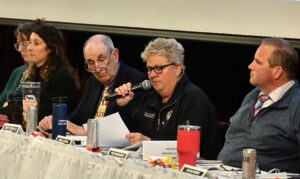
Article 9A was the only item that did not pass. The citizen-petitioned item asked the select board to hire an independent tax auditor for advice before making any changes to the town’s tax structure for fiscal 2026. It failed, 54 to 304.
“In the past five years I’ve lived in Eastham, I’ve heard nothing but words of adoration about our town,” said Natalia Redyk, speaking against the proposal. “It’s clear to me that this town’s administrators are making the town a leader among our neighbors, and for that reason, the petitioned article doesn’t make sense.”

Redyk wasn’t alone. Voters demonstrated their trust in town officials at various points during the meeting. The operating budget, capital budget, and revolving accounts all passed easily and without debate. The town also voted to adopt Article 4B’s “prudent investment rule,” which would allow the town’s trust funds to be invested to combat inflation.
The meeting warmed up as questions were raised about Article 4D, however, which authorized the select board to acquire by eminent domain two duplex units on Route 6 across from Salt Pond. The town had, in 2020, taken half of each duplex from the Delgizzi family for nonpayment of taxes. Town Manager Jacqui Beebe said that owning only half of each duplex had made it impossible for the town to conduct important renovations on either.
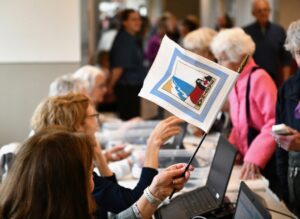
“Will the town be beholden to the same rules as everyone else?” asked Ellen Sicinski, saying she was concerned about housing density on the lots. Beebe responded that the town would “have to follow the same rules” as anyone else. The measure passed 438-44.
The Zoning Rewrite
Zoning was the most exciting item on the agenda, it seemed — a number of voters left after Article 7A passed. That happened easily, on a 415-56 vote, perhaps because Town Planner Paul Lagg and zoning task force chair Mary Nee had spent the months leading up to town meeting conducting public outreach sessions to explain the proposed comprehensive zoning changes that aim to create a walkable mixed-use business district.
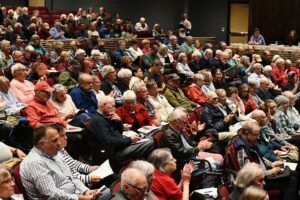
Select board member Jamie Demetri introduced a pair of amendments to the article when she moved it. One was to preserve industrial use around Holmes Road and the other to relax a requirement that businesses construct outdoor amenity spaces. Both amendments passed.
Jennifer Alessi asked whether the new zoning would provide for the recreation space respondents had indicated they wanted at the T-Time area in a 2021 survey. Beebe said that the zoning changes should do that because they were designed to combat sprawl.
Select board candidate Brian Earley reiterated his opposition to the zoning changes. He had voted against recommending them as a planning board member earlier this year. Earley said that, while he found the plan “really well developed,” he worried that it might not work as intended.
Earley returned to the microphone later in the meeting to support Article 8B, which authorized the town to use $380,000 in Community Preservation Act (CPA) funds to renovate the town-owned property that houses the Council on Aging’s thrift store at 580 Massasoit Road.
“That building really is a diamond, and I’d like to see it improved,” Earley said. Constructed between 1871 and 1874, it is the oldest commercial building in Eastham and was bought by the town in 2022 for $450,000 using CPA funds. A few speakers raised concerns about the renovation costs, but the article passed 365-68.
A ‘Seasonal Community’
Article 5A proposed that Eastham accept the “seasonal community” designation as provided by the state’s 2024 Affordable Homes Act. The measure passed 418-64.
The designation was created for towns where a significant number of houses are used as vacation properties rather than as year-round homes. It allows towns to adopt various policies meant to encourage year-round residency, but one of those is the possibility of setting the residential tax exemption at 50 percent — and that’s what raised objections to the designation at Eastham’s meeting.
Select board chair Aimee Eckman spoke in favor of the designation, saying it was “not a regulation but a resource” and that “turning it down would send a message that we don’t need help.” She was challenged by Lisa Radke of the board of registrars, who worried that a high RTE could “put year-rounders at odds” with those who do not live in town.
Article 6A, which authorized the town to request a home-rule petition for a real estate transfer fee on purchases over $1 million, passed 267-76, but only after a lengthy discussion of what the money would be used for. Beebe proposed using it to fund Eastham’s upcoming Lease to Locals year-round rental program.
No to a Tax Consultation
The RTE came up again during discussion of Article 9A, which was moved by Joan Lockhart and seconded by Barbara Reed, who both live in Eastham. Lead petitioner Wendy Gamba, who is treasurer of the Eastham Part-Time Resident Taxpayers Association, then took the microphone, saying there is a “need for forward-looking predictability on tax bills.” She cited frequent Proposition 2½ overrides as evidence that Eastham’s property taxes can be difficult to anticipate.
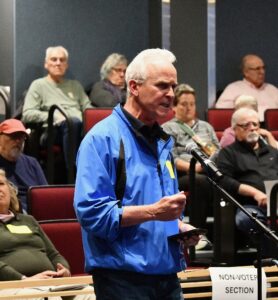
Eckman read from a letter the select board had received in January from a group of Eastham’s part-time residents: “We appreciate everything that the town officials do to make Eastham one of the most desirable and successfully run municipalities in the state.” Eckman said she felt the change in tone evident in Article 9A was backlash against the board for having stated its intention to implement an RTE in the fall.
“This article is not about criticizing the annual budget process,” Gamba said. “This request is for an analysis of the costs that will likely be incurred by the town over the next three years, and a translation of what that means to our future tax bills.”
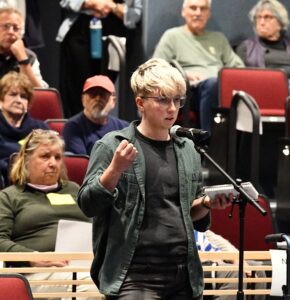
“My property is my only property,” said resident Sarah Burrill. “You seem to be having a hard time affording your second home.”
During a half-hour debate, Lockhart said, “The select board has really dismissed our second-home owners,” adding that “they characterize them as people who are only here to make money off their rentals.”
Delilah Beebe, who graduated from Nauset High School in 2022, stood up to speak about watching her municipal-employee parents, Town Manager Jacqui Beebe and Emily Beebe, who is the health and conservation agent in Truro, invest an “immense amount of time, energy, and life force” in their work. “This article suggests distrust in the town government,” she said. “The more time we spend feeling divided, the less we’re able to get done.”
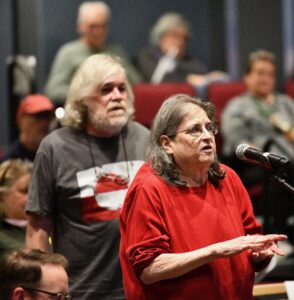
Jim Baughman, an attorney who has served on the town’s conservation commission, called the question to a vote as the clock approached 8:30 p.m., and Town Moderator Scott Kerry told each of the remaining speakers they would have only 30 seconds at the microphone. The motion to vote passed overwhelmingly, the petition failed, and town meeting ended in a smattering of applause.
Are We Having Fun Yet?
In a divided vote, Eastham says yes
By Parker Mumford
EASTHAM — The first question voters decided on at the annual town meeting on May 5 wasn’t a warrant article, nor did it have any impact on meeting policies. It was a straightforward question intended to familiarize the audience with the town’s electronic vote-tallying system: “Are you having fun?”
Lively ranchera music played from the speakers in Nauset High’s brand-new auditorium as the results rolled in. It was the closest margin of the night, with 294 voting in the affirmative and 179 saying no.
“We’ll have to work on that,” said Town Moderator Scott Kerry.
Although the meeting was scheduled for a 5:30 p.m. start, a quorum wasn’t achieved until some 20 minutes later. Voters, seemingly anxious to make up for lost time, asked no questions and made no objections to articles 1, 2, or 3, which set the town’s operating and capital budgets for the year.
Kerry wanted more than polite silence: “I’m biding my time until we vote on when we’re having fun again,” he said, hungrily eyeing the piles of candy the town officials around him were consuming to stay energized.
Ellen Sicinski got the ball rolling by being first to speak up with a question on Article 4D — the purchase of two halves of two duplexes owned by the Delgizzi family. But the moderator shifted gears after she returned to the microphone on two more articles.
“You’re going to win a participation award if you’re not careful,” he said.
More voters joined in when the subject involved a trip to the local playground. Apart from the discussion on a citizen-petitioned article about getting tax strategy advice, the hottest debate of the night was about Article 8E: the use of Community Preservation Act (CPA) funds to install a pair of trailhead kiosks at Wiley Park.
It wasn’t clear whether everyone knew that CPA funds are collected each year from a 3-percent surcharge on property taxes, which is then matched by the state as long as it’s used for community housing, historic preservation, or protecting open space. It doesn’t represent an increase in the town’s overall tax levy.
Keith Burritt was the first to speak, criticizing the project’s $11,000 price tag: “I may be pinching pennies, but, really?” he said. That got some cheers.
Burritt was followed by Open Space Committee chair Frances Lewis, who acknowledged the high price of the bids but spoke in favor of the kiosks. When she said they would look like the ones at Putnam Farm in Orleans, that also got applause.
There was more clapping when former Town Clerk Cindy Nicholson and current conservation commission chair Karen Strauss both spoke in favor of the project, but it didn’t get loud until Jeff Havlick recommended contacting Cape Cod Tech students to do the construction. Lewis then returned to the microphone to explain that she had already reached out to the Tech and that the students were too busy to do it this year. That got a round of very loud clapping from a few audience members who were having too much fun to stop.
When it came time to debate Article 9A, the atmosphere turned serious, and speakers peppered their speeches with a few sassy asides. When Eastham Part-Time Resident Taxpayers Association President Tom McNamara overstayed his allotted 30 seconds at the microphone, a few people on the balcony shouted for an assist from Kerry.
Kerry didn’t ask again if the audience was having fun. But even as the three-hour meeting began to drag, Jim Baughman remained optimistic. “I think one thing we can all agree on,” he said, “is that we’re grateful not to live in Wellfleet.”



